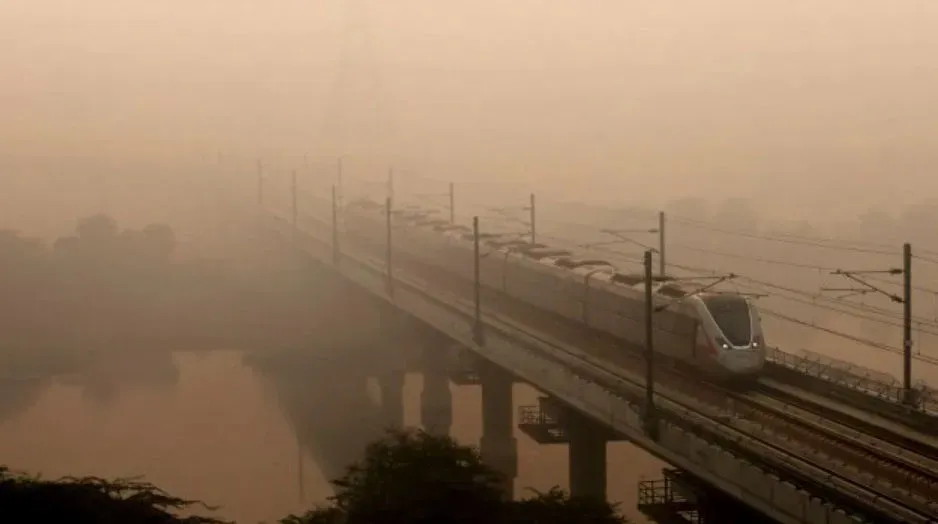What’s in today’s article?
- Why in News?
- What is Air Quality Index (AQI)?
- What is Commission for Air Quality Management (CAQM)?
- What is Graded Response Action Plan (Grap)?
- What is banned under Grap Stage IV?
Why in News?
The Commission for Air Quality Management (CAQM) has enforced Stage 4 of the Graded Response Action Plan (Grap) in Delhi-NCR. This measure follows the region’s Air Quality Index (AQI) crossing into the ‘severe plus’ category, signalling a critical air pollution emergency.
What is Air Quality Index (AQI)?

- AQI was launched in October 2014 to disseminate information on air quality in an easily understandable form for the general public.
- The measurement of air quality is based on eight pollutants, namely, PM10, PM2.5, NO2, SO2, CO, O3, NH3, and Pb
- The AQI transforms complex air quality data of various pollutants into a single number for ease of understanding.
What is Commission for Air Quality Management (CAQM)?
- CAQM is a statutory body formed under the Commission for Air Quality Management in National Capital Region and Adjoining Areas, Act 2021.
- The commission aims at better coordination, research, identification, and resolution of problems related to air quality in NCR and adjoining areas.
What is Graded Response Action Plan?
- About
- GRAP is a set of emergency measures that kick in to prevent further deterioration of air quality once it reaches a certain threshold in the Delhi-NCR region.
- It was approved by the Supreme Court in 2016 and notified in 2017.
- The plan was formulated after several meetings between Environment Pollution (Prevention and Control) Authority (EPCA), state government and experts.
- GRAP works only as an emergency measure.
- The plan does not include action by various state governments to be taken throughout the year to tackle industrial, vehicular and combustion emissions.
- Nature
- GRAP is incremental in nature and thus, when the air quality dips from ‘poor’ to ‘very poor,’ measures listed under both sections have to be followed.
- Grap-I (AQI 201-300): Advisories, dust control, and bans on open burning.
- Grap-II (AQI 301-400): Diesel generator restrictions, enhanced cleaning, and road sprinkling.
- Grap-III (AQI 401-450): Non-essential construction bans, vehicle entry restrictions, and curbs on industrial activity.
- Grap-IV (AQI above 450): Complete construction halts, school closures, and stringent vehicle limitations.
What is banned under Grap Stage IV?
- Entry of non-essential trucks and non-BS-VI light commercial vehicles into Delhi is prohibited.
- Diesel-operated medium and heavy goods vehicles (BS-IV and older) are barred, except those carrying essential items.
- All construction and demolition activities for public infrastructure projects, such as roads, highways, flyovers, and power lines, are suspended.
- The order prohibits entry of trucks into Delhi unless they are carrying essential goods or operating on clean fuels.
- Non-essential light commercial vehicles registered outside Delhi are also barred, except for those running on electric, CNG, or BS-VI diesel engines.
- The panel suggested that offices in the National Capital Region operate at 50 per cent capacity, with the remainder working from home.
- Work-from-home options may also be implemented for central government employees.
- State governments have been advised to consider closing colleges, restricting non-essential commercial activities, and introducing odd-even vehicle rules.
Q.1. What is the Air Quality Index (AQI)?
AQI, launched in 2014, simplifies air pollution data into a single number. It measures eight pollutants, including PM2.5 and NO2, making air quality understandable for the public.
Q.2. What are Grap Stage IV restrictions?
Stage IV bans non-essential trucks, BS-IV diesel vehicles, construction activities, and recommends work-from-home for employees. Schools go online for most classes to combat severe air pollution.
Last updated on June, 2025
→ UPSC Notification 2025 was released on 22nd January 2025.
→ UPSC Prelims Result 2025 is out now for the CSE held on 25 May 2025.
→ UPSC Prelims Question Paper 2025 and Unofficial Prelims Answer Key 2025 are available now.
→ UPSC Calendar 2026 is released on 15th May, 2025.
→ The UPSC Vacancy 2025 were released 1129, out of which 979 were for UPSC CSE and remaining 150 are for UPSC IFoS.
→ UPSC Mains 2025 will be conducted on 22nd August 2025.
→ UPSC Prelims 2026 will be conducted on 24th May, 2026 & UPSC Mains 2026 will be conducted on 21st August 2026.
→ The UPSC Selection Process is of 3 stages-Prelims, Mains and Interview.
→ UPSC Result 2024 is released with latest UPSC Marksheet 2024. Check Now!
→ UPSC Toppers List 2024 is released now. Shakti Dubey is UPSC AIR 1 2024 Topper.
→ Also check Best IAS Coaching in Delhi
























